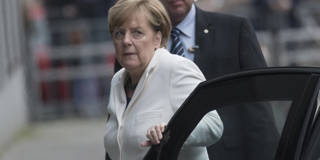Whatever government eventually emerges in Germany following the collapse of the talks to form a new coalition probably won’t be in a strong position to advance much-needed institutional reform of the European Union. The danger is that the EU will remaining in a holding pattern – an outcome that the bloc can ill afford.
MADRID – Over the last two centuries, the “German question” – how to contain a Germany whose dominance was buttressed by its commanding size, high productive capacity, and geographic position at the heart of Europe – has occasioned much worry and not a little warfare. Today, with the collapse of negotiations to form a new government coalition, the question has been turned on its head. European leaders worry that Germany is becoming incapable of assuming enough leadership to guide and champion Europe in a globalized world.

MADRID – Over the last two centuries, the “German question” – how to contain a Germany whose dominance was buttressed by its commanding size, high productive capacity, and geographic position at the heart of Europe – has occasioned much worry and not a little warfare. Today, with the collapse of negotiations to form a new government coalition, the question has been turned on its head. European leaders worry that Germany is becoming incapable of assuming enough leadership to guide and champion Europe in a globalized world.